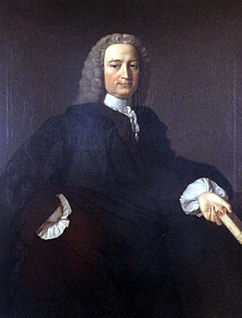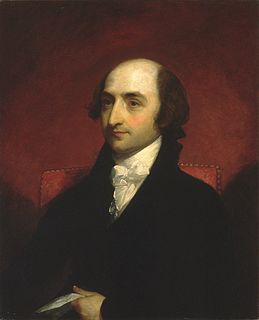A Quote by Francis Hutcheson
Unalienable rights are essential limitations to all governments.
Quote Topics
Related Quotes
Democracies have been, and governments called, free; but the spirit of independence and the consciousness of unalienable rights, were never before transfused into the minds of a whole people....The feeling of equality which they proudly cherish does not proceed from an ignorance of their station, but from the knowledge of their rights; and it is this knowledge which will render it so exceedingly difficult for any tyrant ever to triumph over the liberties of our country.
Nothing is more deceptive or more dangerous than the pretence of a desire to simplify government. The simplest governments are despotisms; the next simplest, limited monarchies; but all republics, all governments of law, must impose numerous limitations and qualifications of authority, and give many positive and many qualified rights.
Look, you are interested in trying to make sure that governments keep a clean environment, have regard for the lifestyles of indigenous peoples, and work for fair trade rules. Well, it's exactly the same for human rights - from non-discrimination to the basic rights to food, safe water, education and health care. We are talking rights not needs. There are standards that governments have signed up to - but nobody is holding them to account.
Thomas Jefferson understood the greater purpose of the liberty that our Founding Fathers sought during the creation of our Nation. Although it was against the British that the colonists fought for political rights, the true source of the rights of man was clearly stated in the Declaration of Independence. Jefferson wrote that all humans are endowed by their Creator with certain unalienable Rights . . . . It was self-evident to him that denying these rights was wrong and that he and others must struggle to win what was theirs.
All men are, or ought to be free, possessing unalienable rights, and the high and noble qualifications of the laws of nature and of self-preservation, to think, and act, and say as they please, while they maintain a due respect to the rights and privileges of all other creatures, infringing upon none.
Can one generation bind another, and all others, in succession forever? I think not. The Creator has made the earth for the living, not the dead. Rights and powers can only belong to persons, not to things, not to mere matter endowed with will...Nothing is unchangeable but the inherent and unalienable rights of man.
By far the most numerous and most flagrant violations of personal liberty and individual rights are performed by governments... The major crimes throughout history, the ones executed on the largest scale, have been committed not by individuals or bands of individuals but by governments, as a deliberate policy of those governments-that is, by the official representatives of governments, acting in their official capacity.
First there is the democratic idea: that all men are endowed by their creator with certain natural rights; that these rights are alienable only by the possessor thereof; that they are equal in men; that government is to organize these natural, unalienable and equal rights into institutions designed for the good of the governed, and therefore government is to be of all the people, by all the people, and for all the people. Here government is development, not exploitation.
So what's the difference between republican and democratic forms of government? John Adams captured the essence of the difference when he said, 'You have rights antecedent to all earthly governments; rights that cannot be repealed or restrained by human laws; rights derived from the Great Legislator of the Universe.' Nothing in our Constitution suggests that government is a grantor of rights. Instead, government is a protector of rights.
America was the first country in history to be founded on, people have rights. Not the divine right of kings, not the emperor's a god, or idolized, or we have to do what the dear leader says. And, expressly, that it's a system of equal rights, and then governments are instituted to secure those rights.








































